
This issue covers a wide range of topics, including the underexplored origins of the Hungarian labor service in the mid-1930s, the ideologically charged reception of the first major trial focusing on the Holocaust in the early 1960s, the history of human emotions, the “cold” history of a bureaucracy, the economic motivation and involvement of local perpetrators, and the specific experiences of Hungarian Jewish ghetto dwellers in various ghettos and slave laborers in an unfamiliar and inhospitable metropolis. Free for download at http://www.hunghist.org/index.php/issue-current/79-hhr-issue/314-volume-4-issue-3
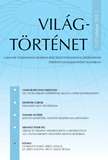 The third issue of World History (Világtörténet) for 2015, a thematic issue dedicated to the topic of „The Great War and the Balkans” edited by László Bíró has been published. As recently new interpretations have appeared in the literature and the earlier debates regarding the role and responsibility of the small states in the outbreak of WWI have deepened further, the editorial board has decided to publish a thematic issue on the connection between the Balkan peninsula and WWI. We did not intend to outline a summary or synthesis, which task cannot be assigned to a journal with limited space, but rather to emphasize certain problems and focus on debated questions, like state-building in the Balkans; international peace-keeping and the powers; the responsibility of nations states and their willingness to contribute to the settling of international relations; instruments of enforcing economic interests; the aims of cultural penetration and dissemination and humanitarian aid.
The third issue of World History (Világtörténet) for 2015, a thematic issue dedicated to the topic of „The Great War and the Balkans” edited by László Bíró has been published. As recently new interpretations have appeared in the literature and the earlier debates regarding the role and responsibility of the small states in the outbreak of WWI have deepened further, the editorial board has decided to publish a thematic issue on the connection between the Balkan peninsula and WWI. We did not intend to outline a summary or synthesis, which task cannot be assigned to a journal with limited space, but rather to emphasize certain problems and focus on debated questions, like state-building in the Balkans; international peace-keeping and the powers; the responsibility of nations states and their willingness to contribute to the settling of international relations; instruments of enforcing economic interests; the aims of cultural penetration and dissemination and humanitarian aid.
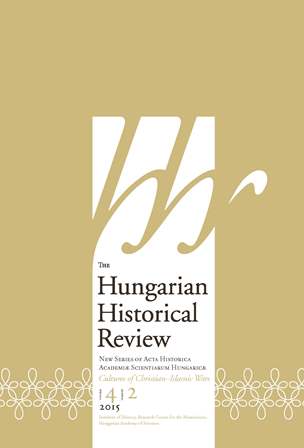 How did participants perceive and interpret the violence of war and their own roles in it? Why did they write about their experiences afterwards? What kinds of survival strategies did peasants, citizens and nobleman develop amidst the everyday experiences of brutality, devastation and death? How was extreme cruelty remembered, and how was war experienced? How did reality and mythology (about the extreme brutality of the enemy, for instance) blend in individual memory and in the cultural memories of communities?
How did participants perceive and interpret the violence of war and their own roles in it? Why did they write about their experiences afterwards? What kinds of survival strategies did peasants, citizens and nobleman develop amidst the everyday experiences of brutality, devastation and death? How was extreme cruelty remembered, and how was war experienced? How did reality and mythology (about the extreme brutality of the enemy, for instance) blend in individual memory and in the cultural memories of communities?
Gabriella Erdélyi
Special Editor of the Thematic Issue
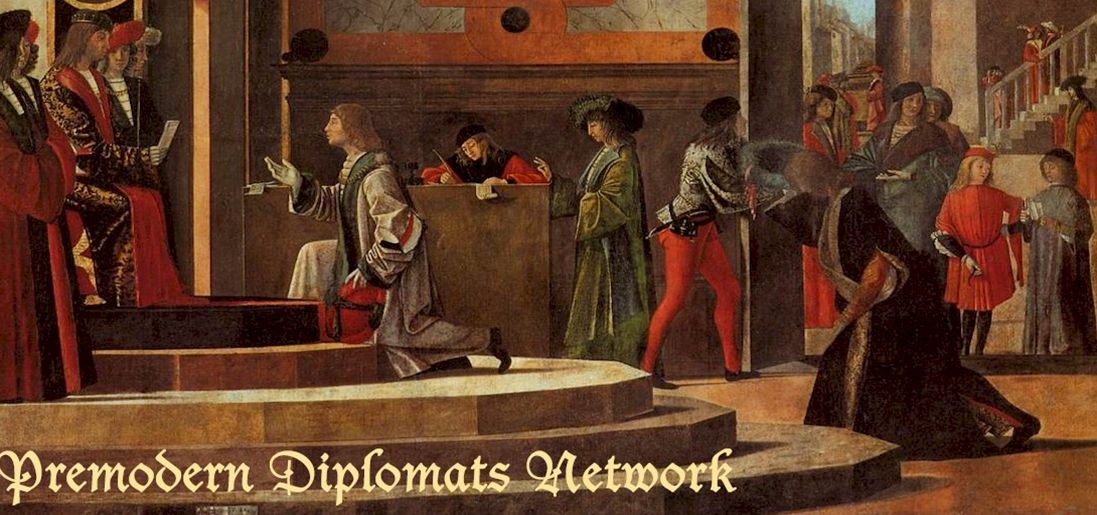 The Premodern Diplomats Network, founded two years ago, will hold its fourth conference on the 25th and 26th of September in our institute. At the event Splendid Encounters: Diplomats and Diplomacy in the Early Modern World researchers from a variety of European countries come together to discuss their experiences in the study of the history of diplomacy between the sixteenth and eighteenth centuries. The conference programme is available here.
The Premodern Diplomats Network, founded two years ago, will hold its fourth conference on the 25th and 26th of September in our institute. At the event Splendid Encounters: Diplomats and Diplomacy in the Early Modern World researchers from a variety of European countries come together to discuss their experiences in the study of the history of diplomacy between the sixteenth and eighteenth centuries. The conference programme is available here.
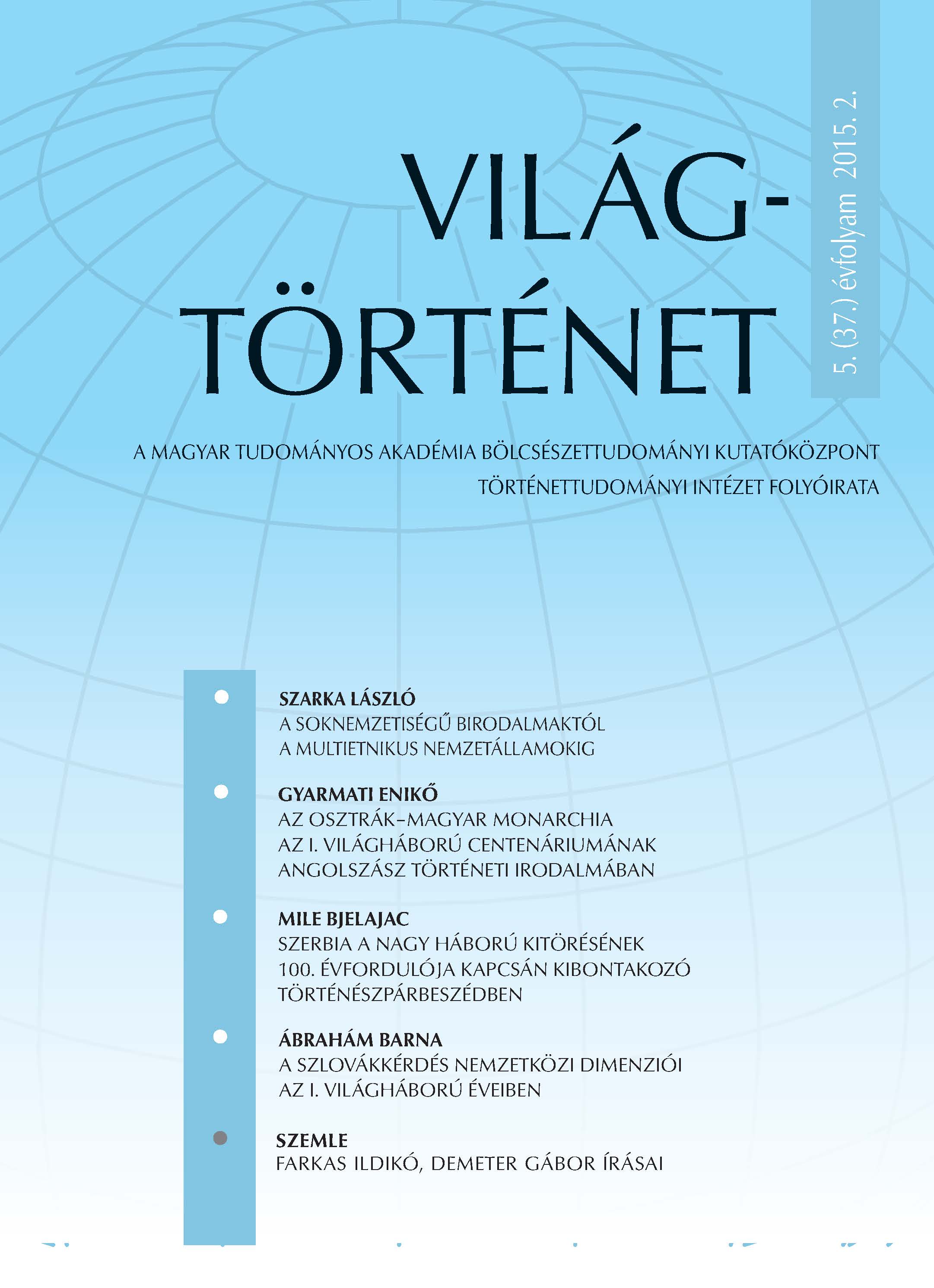 The second issue of World History (Világtörténet) for 2015 is a thematic issue dedicated to the topic of „The Great War” edited by László Szarka has been published. The centenary of the Great War gave birth to many comprehensive monographs, profound debates on explanations and both thematically and methodologically innovative approaches first of all with emphasis upon transnational aspects. As a result, in the international historiography of the Great War the complex evaluation of this over important event became an absolute imperative.
The second issue of World History (Világtörténet) for 2015 is a thematic issue dedicated to the topic of „The Great War” edited by László Szarka has been published. The centenary of the Great War gave birth to many comprehensive monographs, profound debates on explanations and both thematically and methodologically innovative approaches first of all with emphasis upon transnational aspects. As a result, in the international historiography of the Great War the complex evaluation of this over important event became an absolute imperative.
As the long-lasting consequence of the First World War, we may consider the complete restructuring of the European state system achieved by the peace settlements in Brest-Litovsk, in Versailles and in Sevres. The most controversial issue of the nation- and state-building efforts within the borders of the multi-national dynastic Empires leading up to these catastrophic events is represented almost only in the national historiographies. This edition is dedicated to the evaluation of the extraordinarily complex process of nationalism in Central-Eastern and South-Eastern Europe which on the one hand had been radicalised within the Empires, on the other hand had undoubtedly been promoted to the most important problem in terms of geopolitics and from the point of view of the Great Powers. In addition to the strong dynastic loyalties at the beginning of the war the war events, the brutal treatment by the civil and military authorities, the millions of refugees and the intense harassment of the nationalities gave way to national feelings and interests.
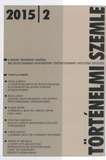 The second issue of Historical Review for 2015 has been published. Károly Goda’s study examines medieval Corpus Christi festivities and processions in a Central European context, arguing that with regard to the feast of the Eucharist the ecclesiastical sphere was in no way separated from the political one. Péter Tusor’s essay analyses in detail, in the framework of a research on the political role of the ecclesiastical estat, especially in the early modern era, and on the basis of newly discovered sources, the measures taken by its leader, György Lippay, primate of Hungary (1642-1666) in the interest if Miklós Zrínyi, ban of Croatia (1647-1664) in the court of Vienna during 1663–1664. Orsolya Völgyesi’s study hows the influence of Ferenc Kölcsey on the younger “reform” generation in the political environment of the 1830s. Viktória Kovács’s essay tries to shed light on the background to the landowning of the Premonstratensians examining and comparing different sources. János Buza’s paper deals with the characteristics of minting in Hungary before 1526. György Kurucz’s paper argues that the process of turning an uprising into a legitimate freedom fight for the elimination of the excesses of the Habsburg administration in the Kingdom of Hungary, including the recognition of the Hungarians as a negotiating party by the English and Dutch diplomacy at the beginning of the 18th century, was largely dependent on the military progresses made by the insurgent troops of Prince Ferenc Rákóczi II. Bálint Varga’s study attempts to answer the question, how 19th century historians tried to interpret „inconvenient” events (that after settling in the Carpathian Basin in the early 10th century, pagan and nomadic Magyar tribes led a series of military campaigns against the organized states of Christian Europe) in a way that they could still insert into the master narrative of the glorious national past, utilizing the required methodology of historiography. Miroslav Michaela’s study is dealing with an analysis of political and symbolic levels of the cult of St. Stephen in (Czecho)slovakia during the inter-war period.
The second issue of Historical Review for 2015 has been published. Károly Goda’s study examines medieval Corpus Christi festivities and processions in a Central European context, arguing that with regard to the feast of the Eucharist the ecclesiastical sphere was in no way separated from the political one. Péter Tusor’s essay analyses in detail, in the framework of a research on the political role of the ecclesiastical estat, especially in the early modern era, and on the basis of newly discovered sources, the measures taken by its leader, György Lippay, primate of Hungary (1642-1666) in the interest if Miklós Zrínyi, ban of Croatia (1647-1664) in the court of Vienna during 1663–1664. Orsolya Völgyesi’s study hows the influence of Ferenc Kölcsey on the younger “reform” generation in the political environment of the 1830s. Viktória Kovács’s essay tries to shed light on the background to the landowning of the Premonstratensians examining and comparing different sources. János Buza’s paper deals with the characteristics of minting in Hungary before 1526. György Kurucz’s paper argues that the process of turning an uprising into a legitimate freedom fight for the elimination of the excesses of the Habsburg administration in the Kingdom of Hungary, including the recognition of the Hungarians as a negotiating party by the English and Dutch diplomacy at the beginning of the 18th century, was largely dependent on the military progresses made by the insurgent troops of Prince Ferenc Rákóczi II. Bálint Varga’s study attempts to answer the question, how 19th century historians tried to interpret „inconvenient” events (that after settling in the Carpathian Basin in the early 10th century, pagan and nomadic Magyar tribes led a series of military campaigns against the organized states of Christian Europe) in a way that they could still insert into the master narrative of the glorious national past, utilizing the required methodology of historiography. Miroslav Michaela’s study is dealing with an analysis of political and symbolic levels of the cult of St. Stephen in (Czecho)slovakia during the inter-war period.
RCH „Lendület” Medieval Hungarian Economic History Research Team led by Boglárka Weisz will receive priority support in the „Momentum” Program of the Hungarian Academy Sciences from July 2015 to June 2020. The Driving Forces of the Hungarian Economy in the Centuries of the Middle Ages Program conducts an interdisciplinary research of the factors that influence the way the economy of Hungary operates and changes throughout and beyond the Middle Ages, as from an economic historian’s point of view, 1526 cannot be considered an end of an era and a beginning of a new one.
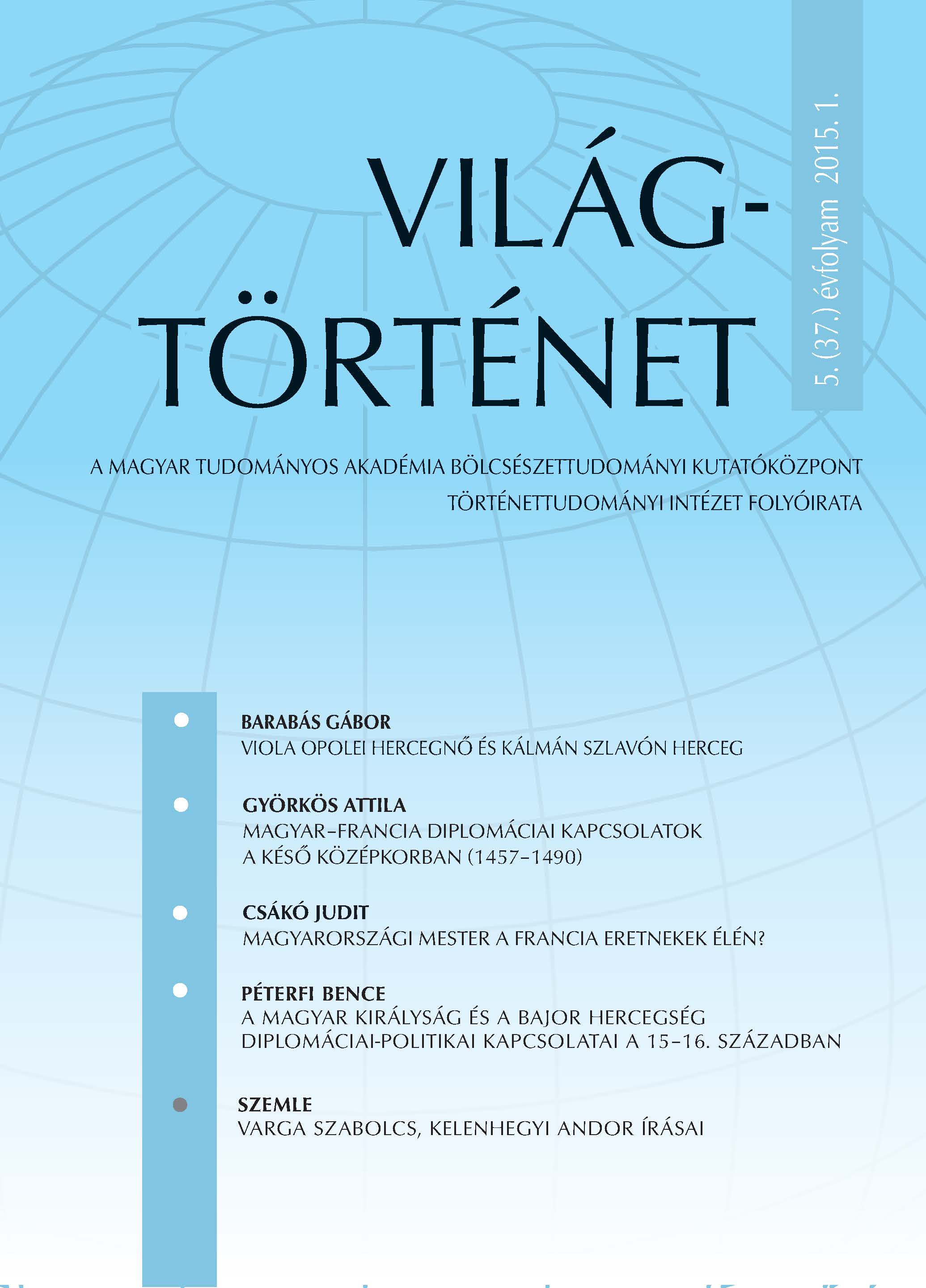 The first issue of World History (Világtörténet) for 2015 is a thematic issue dedicated to the topic of „Medieval Diplomacy and the Holy See” edited by Renáta Skorka has been published.
The first issue of World History (Világtörténet) for 2015 is a thematic issue dedicated to the topic of „Medieval Diplomacy and the Holy See” edited by Renáta Skorka has been published.
The official and documented form of the relationship between states existed already in the Middle Ages. The envoys sent out in order to protect the persons and wealth of subjects, to settle armed conflicts, or to establish formal alliances, and in the meantime collecting news and information, acted in the medieval period upon ad hoc commissions, and their tasks were related not to geographical regions but to actual tasks. The foreign policies of medieval powers were entrusted to such occasional diplomats, prelates, monks, merchants, intellectuals or lay aristocrats, who were naturally expected to be familiar and comply with the legal, traditional, cultural and ceremonial rules of diplomatic protocol. It is far from surprising that in the 13th to 15th centuries the most widespread diplomatic relations were nurtured by the Papal state, which frequently intervened on the behalf of individuals or states as a protector, mediator, arbitrator or intriguer. All of these roles are either exemplified or at least hinted at in the papers which appear in this second medieval issue of the review Világtörténet.
Page 2 of 12